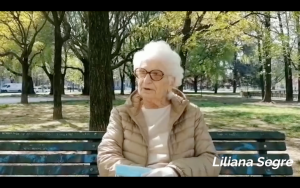NEWS Remembering names in the time of crisis
“This year, I will not be able to light the candle to remember our 6 million dead, but I am with them. I do remember those I met, who did not come back to tell their stories. They are distant voices, but they are ever-present in my life. I know many names by heart and every time I would like to say them out loud: Alberto, Olga, Giuseppe Segre. And all the others I met with a glance, which meant the world to me,” said Liliana Segre.
On this year’s Yom HaShoah, she could not light a candle in Milan Synagogue, as she used to do in past years in remembrance of the victims of the Nazi-Fascist genocide and of her relatives murdered in Auschwitz. Thanks to the Association Children of the Shoah, Segre and other children and grandchildren of survivors had the chance to commemorate their families on a virtual space. On the occasion of Yom HaShoah, the Association launched a video collecting testimonies. In addition to Liliana Segre’s, the most significant are those by Rosa Bauer, Amiel Shek, Maya Maggi, Gadi Schoenheit, Emanuele Fiano and his son Davide.
“We tried to keep the message clear and simple, giving a voice to Liliana and the survivors’ children. Due to lockdown restrictions, we could not read out the deportees’ names in Milan Synagogue. Youngsters from the Jewish community have always done it and I believe they will resume this tradition in the future,” explained Daniela Dana Tedeschi, vice President of the Association Children of the Shoah.
“To keep the memory of those names alive, even now that we are in forced isolation, we made another video with a list of them. It is a virtual wall of names inspired by similar initiatives in other parts of the world and is meant to remain for posterity and to be updated. We hope this idea will be reproduced in other Italian cities.” According to Tedeschi, the opportunity to use virtual platforms for Remembrance will grow more and more important in the future, “and it can coexist with the irreplaceable work” in the real world.
Translated by Claudia Azzalini and revised by Mattia Stefani, both students at the Advanced School for Interpreting and Translation of Trieste University and interns at the newspaper office of the Union of the Italian Jewish Communities.

